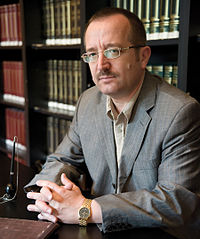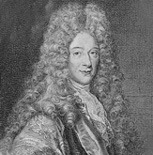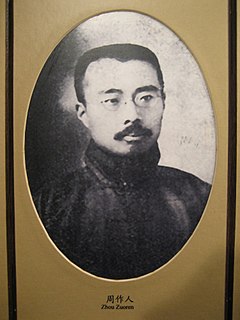 W
WJudah Leib Ben-Ze'ev was a Galician Jewish philologist, lexicographer, and Biblical scholar. He was a member of the Me'assefim group of Hebrew writers, and a "forceful proponent of revitalizing the Hebrew language".
 W
WFrederik Moltke Bugge was a Norwegian philologist and educator.
 W
WGeorge Chapman was an English dramatist, translator and poet. He was a classical scholar whose work shows the influence of Stoicism. Chapman has been speculated to be the Rival Poet of Shakespeare's sonnets by William Minto, and as an anticipator of the metaphysical poets of the 17th century. Chapman is best remembered for his translations of Homer's Iliad and Odyssey, and the Homeric Batrachomyomachia.
 W
WBon Joseph Dacier was a French historian, philologist and translator of ancient Greek. He became a Chevalier de l'Empire, then Baron de l'Empire. He also served as curator of the Bibliothèque nationale.
 W
WAzra Erhat was a Turkish author, archaeologist, academician, classical philologist, and translator. A pioneer of Turkish Humanism, Azra Erhat is especially well known for her published works, including many translations into Turkish from the classical literature of Ancient Greece.
 W
WEuthymius the Athonite was a Georgian monk, philosopher and scholar, who is venerated as a saint. His feast day in the Orthodox Church is May 13.
 W
WHellmut Flashar is a German classical philologist and translator.
 W
WHjalmar Gullberg was a Swedish writer, poet and translator of Greek drama into Swedish.
 W
WPiotr Iwaszkiewicz is a Polish political historian, translator and diplomat, an ambassador to Uzbekistan (2015–2020).
 W
WIgnacy Błażej Franciszek Krasicki, from 1766 Prince-Bishop of Warmia and from 1795 Archbishop of Gniezno, was Poland's leading Enlightenment poet, a critic of the clergy, Poland's La Fontaine, author of the first Polish novel, playwright, journalist, encyclopedist, and translator from French and Greek.
 W
WJohannes Lievens, Latinized Johannes Livineius (1546/47–1599), was a scholar of Greek patristics from the Habsburg Netherlands.
 W
WSpiridion Lusi was a Greek scholar, diplomat, politician and naturalized ambassador of Prussia.
 W
WNicolas de Malézieu was a French intellectual, Greek scholar and mathematician.
 W
WUku Masing was an Estonian philosopher. He was a significant figure in Estonian religious philosophy. Masing also wrote poetry, mostly on religious issues. Masing authored one novel, Rapanui vabastamine ehk Kajakad jumalate kalmistul in the late 1930s, which was published posthumously in 1989. As a folklorist, he was a distinguished researcher of fairy tales, contributing to the international Encyclopedia of the Folktale. He was awarded the Righteous Among The Nations by Yad Vashem and the Israeli Supreme Court for his participation during the Holocaust in helping a Jew in Estonia escape capture from 1941 until the end of the war. His actions exposed him to great danger during this period requiring him to meet with his friend as well as lying to the Gestapo.
 W
WPeter Nielsen Østbye was a Norwegian philologist and academic administrator. He taught classical languages and was a proponent of learning the Latin language. He was an education official at Fredrikstad between 1894-1910 and at Drammen between 1910-1926. He is principally known for his translations of Homer's epic poems, the Iliad and the Odyssey from Ancient Greek into Norwegian.
 W
WAurel Plasari is an Albanian, lecturer, scholar, writer, translator and professor.
 W
WPierre Quillard was a French symbolist poet, playwright, translator, and journalist. An anarchist and supporter of Dreyfus, he later became one of the first people to defend the Armenians persecuted under the Ottoman Empire. In his youth, Quillard was a pupil of the Lycée Fontanes, where he counted Éphraïm Mickaël, Stuart Merrill, René Ghil, André Fontainas, Rodolphe Darzens, and Georges Vanor among his classmates.
 W
WJohann Christoph Friedrich (von) Schiller was a German poet, philosopher, physician, historian, and playwright. During the last seventeen years of his life (1788–1805), Schiller developed a productive, if complicated, friendship with the already famous and influential Johann Wolfgang von Goethe. They frequently discussed issues concerning aesthetics, and Schiller encouraged Goethe to finish works he left as sketches. This relationship and these discussions led to a period now referred to as Weimar Classicism. They also worked together on Xenien, a collection of short satirical poems in which both Schiller and Goethe challenge opponents of their philosophical vision.
 W
WGeorg Friedrich Schömann, was a German classical scholar of Swedish heritage.
 W
WTheodore Philip Stephanides was a Greek-British doctor and polymath, best remembered as the friend and mentor of Gerald Durrell.
 W
WJacques de Tourreil was a French jurist, orator, translator and man of letters.
 W
WFrederik Ludvig Vibe was a Norwegian classical philologist and educator. He was Professor of Greek language at the Royal Frederick University from 1838.
 W
WCarel Vosmaer was a Dutch poet and art critic, born at The Hague. He wrote under the pseudonym Flanor.
 W
WChristopher Whyte is a Scottish poet, novelist, translator and critic. He is a novelist in English, a poet in Scottish Gaelic, the translator into English of Marina Tsvetaeva, Pier Paolo Pasolini and Rainer Maria Rilke, and an innovative and controversial critic of Scottish and international literature. His work in Gaelic also appears under the name Crìsdean MacIlleBhàin.
 W
WZhou Zuoren was a Chinese writer, primarily known as an essayist and a translator. He was the younger brother of Lu Xun, the second of three brothers.